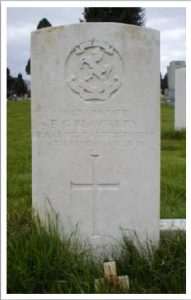Depot Battalion, Queen’s Own (Royal West Kent Regiment)

Francis George Blockley was born in the final months of 1899, the son of Thomas Blockley and his wife Emily (née Moulds). According to the 1911 Census Thomas was a jobbing gardener and the couple had five children, two of whom had died by the time of the census. According to a family tree published on the Ancestry website the two children who had died were Herbert Stanley and Reginald Henry, both born in 1902 (so presumably twins) and both of whom died in 1904. The surviving children were Thomas Moulds Blockley (a printer ’s apprentice), Emily Hilda and Francis George. The family lived at 21 Morton Street, Gloucester. Thomas Blockley senior died in 1920, aged 54.
Whilst no Army Service Record has survived for Francis Blockley, a pension record does exist and and this does give some useful information relating to his time in the Army.
Francis had originally enlisted (probably in the early weeks of the war) when under age (probably 15), quoting his occupation as being a horse driver. He was posted to the 12th Battalion, Worcestershire Regiment and assigned the number 15830. His true age was discovered in 1916 and he was discharged at Wareham, Dorset on 13 March 1916 at a stated age of 16 years and six months on grounds that ‘he had made a false statement on enlistment’. The ‘Proceeds on Discharge’ form notes his address to be 2 Northfield Cottages, Northfield Road, Gloucester and that he was a ‘clean smart soldier’.
Upon reaching the qualifying age of 17 Francis rejoined the Army and on 28 September 1916 he attested at Gloucester for service for the duration of the war, when aged 17 years and one month. His declared occupation was a labourer. He was placed in the Reserve and mobilised exactly one year later, being posted to the 37th Young Soldier Battalion.
On 1 November 1917, following a reorganisation he transferred to 53rd Training Reserve (Hampshire Regiment) then on 12 February 1918 he was posted to 4th (Reserve) Battalion, Hampshire Regiment.
He served in the UK until 1 April 1918 and on the following day joined up with the British Expeditionary Force in France, initially posted to the 15th Hampshires. However, possibly as a result of losses sustained during the great German Spring Offensive of that year, he was almost immediately re-assigned to the Queen’s Own (Royal West Kent) Regiment and given the number G/29230. Unfortunately, the surviving records do not quote a specific battalion number.
It would appear that sometime between 2 April and 18 May 1918 he was wounded and he was returned to the UK on 19 May, when he would have been posted to the Depot Company. On 4 July 1918 he was discharged from the Army as ‘no longer fit for military service’ and was given a Silver War Badge, to denote his previous service. Overall, he had served, legitimately for one year and 280 days.
The surviving pension papers do not state what form of Army pension he received or the nature of his wounds or disablement. However, his Pension Record Card, released on the Ancestry
website in late 2018, notes that his disability was tuberculosis of lungs and larynx.
He was granted a 100% disablement pension (40 shillings (£2)) per week from 19 April 1920 to 30 November 1920, reduced to 70% (28 shillings (£1.40) per week) from 1 December 1920 to 31 May 1921.
There is an interesting report in the Gloucestershire Chronicle of 30 August 1919 of his appearance in front of a magistrate on a charge of being drunk and disorderly and assaulting a police officer. A £5 fine plus costs was imposed. His address was given as 2 Northfield Road, Tuffley, Gloucester.
Francis George Blockley died on 4 June 1921, aged 21, probably due to tuberculosis. He was buried in Gloucester Old Cemetery, where a standard CWGC headstone marks his grave, possibly on what was a family grave, with a stone kerb surround.
Researched by Graham Adams 23rd December 2018
